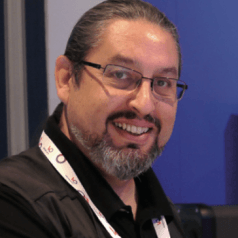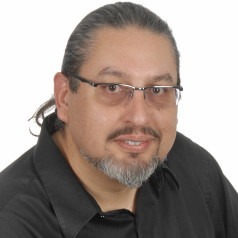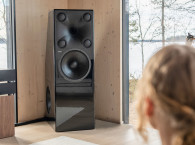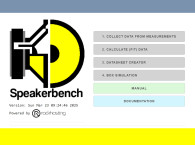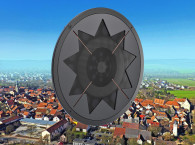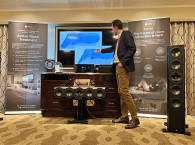
As Vance pointed out at the time, "For compression driver use in pro sound products, this new technology also has an extremely beneficial combination of very low moving mass, very high moving surface area, large length of conductor in the magnetic field, and high magnetic field strength, which results in the mass-break frequency being several octaves higher than the typical 3.5 kHz exhibited by traditional moving-coil compression drivers." That article has since been posted online in its entirety and is available here.
Fast forward to May 2018, at the High End show in Munich, I'm always on the watch for new technologies and designs - transducers in particular. During the second day of the show, in occasional chats with different friends on "what caught my eye," I learned that there was this "very exciting and promising" new driver being introduced at the show by a startup company and I was strongly advised to see it. Not knowing the exact location for the exhibit, it wasn't until the last day of the show, when on advice from our colleague Ward Maas, we decided to visit the "Newcomers" exhibits, where new companies pitch their new ideas, inventions and, sometimes, actual products.
There, we were fortunate to meet British manufacturer Arya Audio Labs and we were pleased to find a longtime friend of audioXpress and Voice Coil, Arthur Marker, now in charge of this new company introducing AirBlade, a revolutionary loudspeaker driver!

For some reason, this product introduction at the Munich High End show looked familiar, but our visit was on the last day of the show, we couldn't stay very long, Arthur also had a meeting, and it wasn't until we returned home that I was able to investigate further, rediscovered the Christensen article, and decided to get back to Arthur and ask further questions.
Arthur kindly confirmed how, after having done extensive research on nonlinearities in loudspeakers and how to mitigate their drawbacks during his time at University of Southampton in the UK, a leading acoustic research institute, he decided to lead the Arya Audio Labs team. The company brings together the best expertise from different fields and with access to advanced prototyping tools including 3D printing, 5-axis CNC machines, and state-of-the-art measurement facilities.
After graduating with a MSc in Engineering Acoustics from the Institute of Sound and Vibration Research/ISVR in UK (1st class honors) and with BEng in Electrical Engineering from DHBW University Stuttgart (1st class honors), Arthur Marker's professional experience already includes working for Apple (California, USA), Cirrus Logic (Southampton, UK), and Valeo (Stuttgart, Germany) on audio hardware design, FPGA development, Acoustic Validation, Acoustic Echo Cancellation, and DSP Design/Tuning.
Through his work, he also came across scientist and inventor E.J. Christensen who suggested the before-mentioned transducer concept based on the AMT principle that had the potential to solve all major issues of the dynamic loudspeaker. The two scientists initiated contact in 2016 and the common interest in overcoming the limitations of current driver technologies led to a partnership between them. What followed were extensive R&D activities to bring this transducer concept into commercial products, resulting in the company Arya Audio Labs being officially established in 2017.
In May 2018, the first AirBlade driver based on this new approach was finally presented to the public at the Munich High End show and was met with great interest from the audio industry as, according to Arthur, "it represents a significant technological leap forward compared to existing transducer technologies and offers unique features."

AirBlade is a broadband (<1 kHz to >20 kHz), low distortion, high power, linear phase and linear impedance loudspeaker driver that does not become directional toward higher frequencies. Unlike traditional drivers that are using a single heavy diaphragm with separate voice coil attached to it, AirBlade utilizes very light ring-shaped foil elements as diaphragm, where conductive traces are directly laminated onto it. By distributing the diaphragm area over several layers and implementing a curved shape, AirBlade avoids several drawbacks of traditional drivers like beaming (sweet-spot problem). The effective diaphragm surface area in the AirBlade driver, measuring 19,200 mm2, is more than 37 times bigger compared to that of a traditional 1" driver while having similar outer dimensions. That results in improved air coupling, sensitivity and power handling and, at the same time, reduced distortion.
The company plans to offer its drivers targeting the high-end audio market. Apart from the AirBlade driver project, Arya Audio Labs is also working on several other projects, such as the RevOpod damper or a range of Kappa cables for state-of-the-art high-end applications.
www.arya-audio.com


